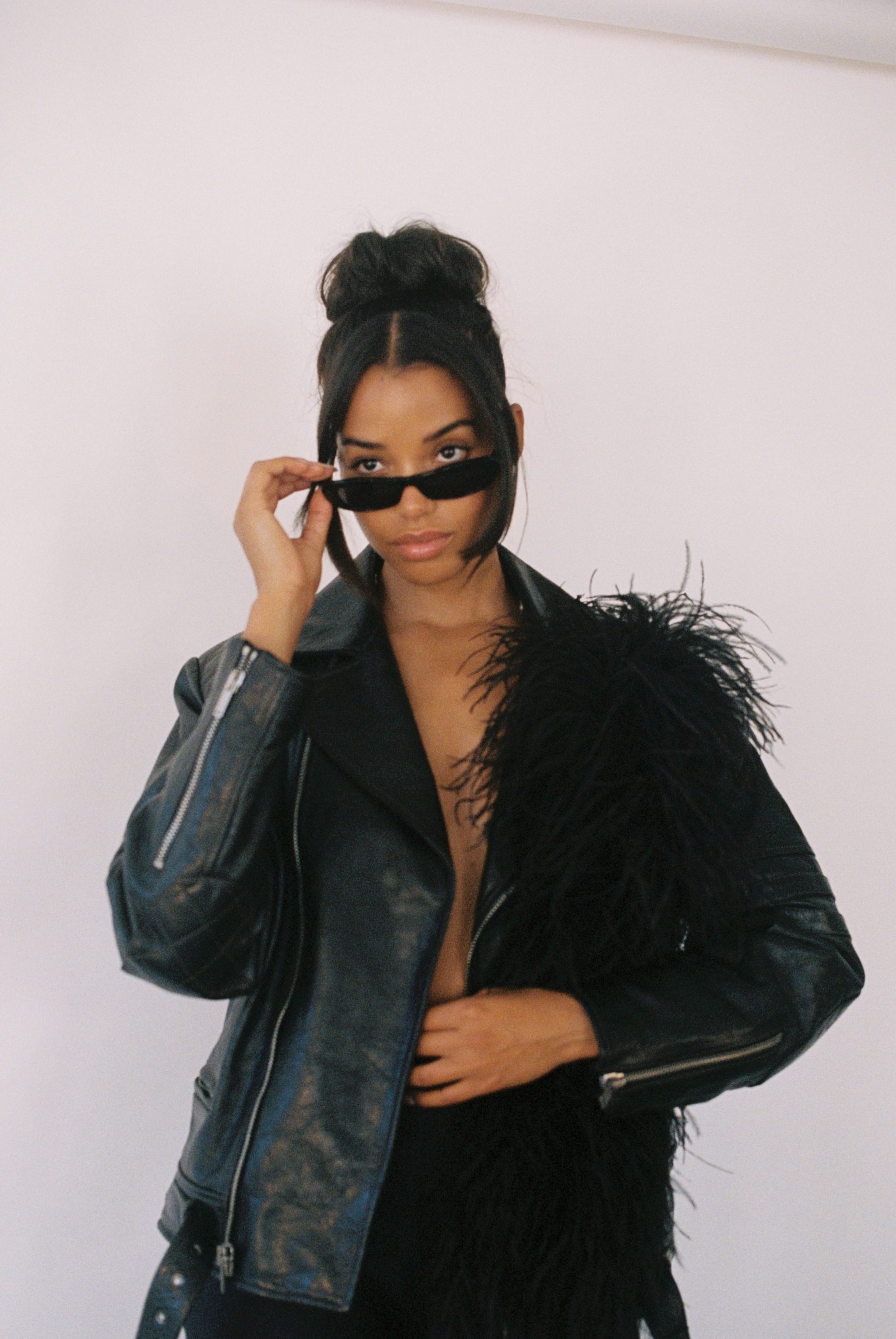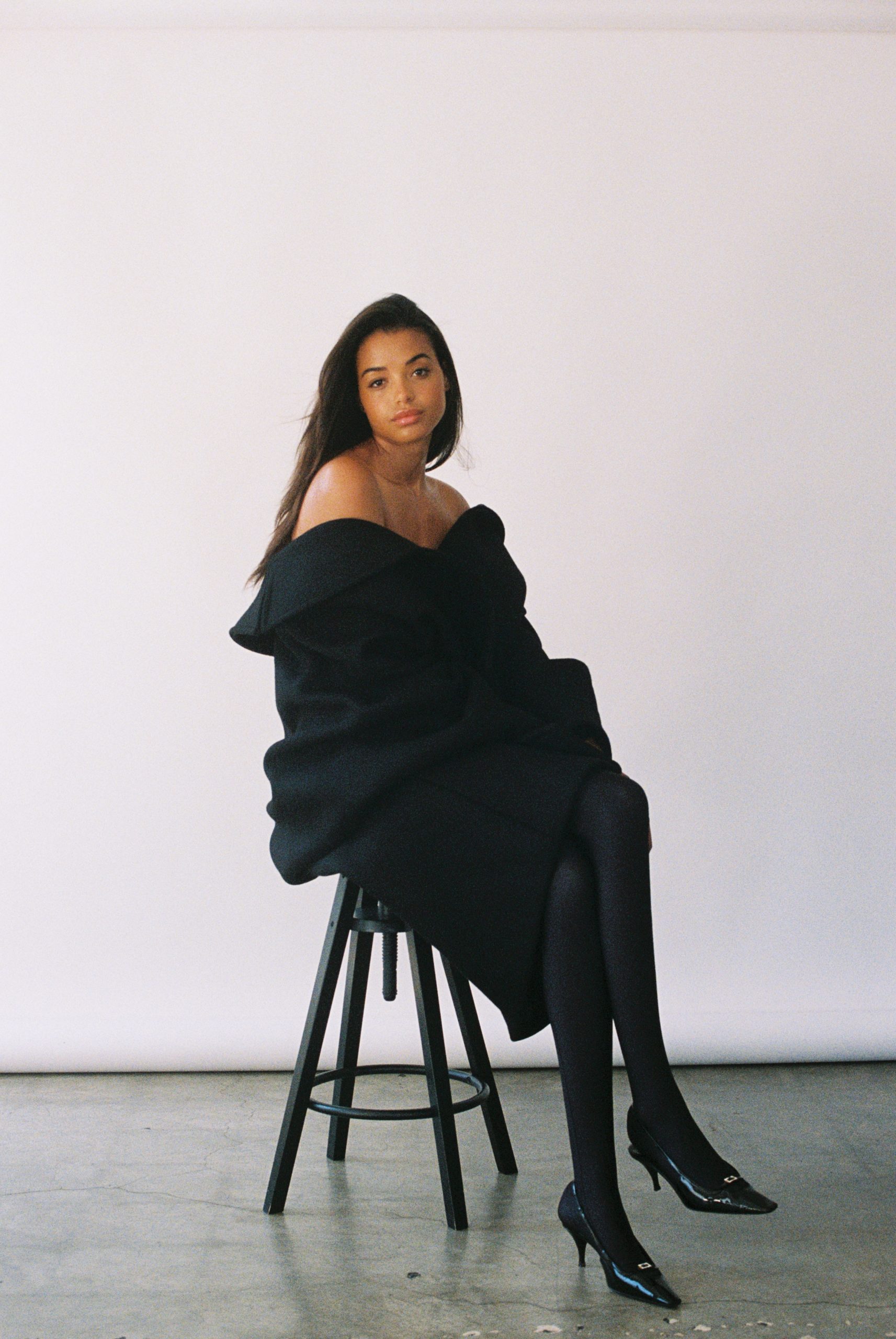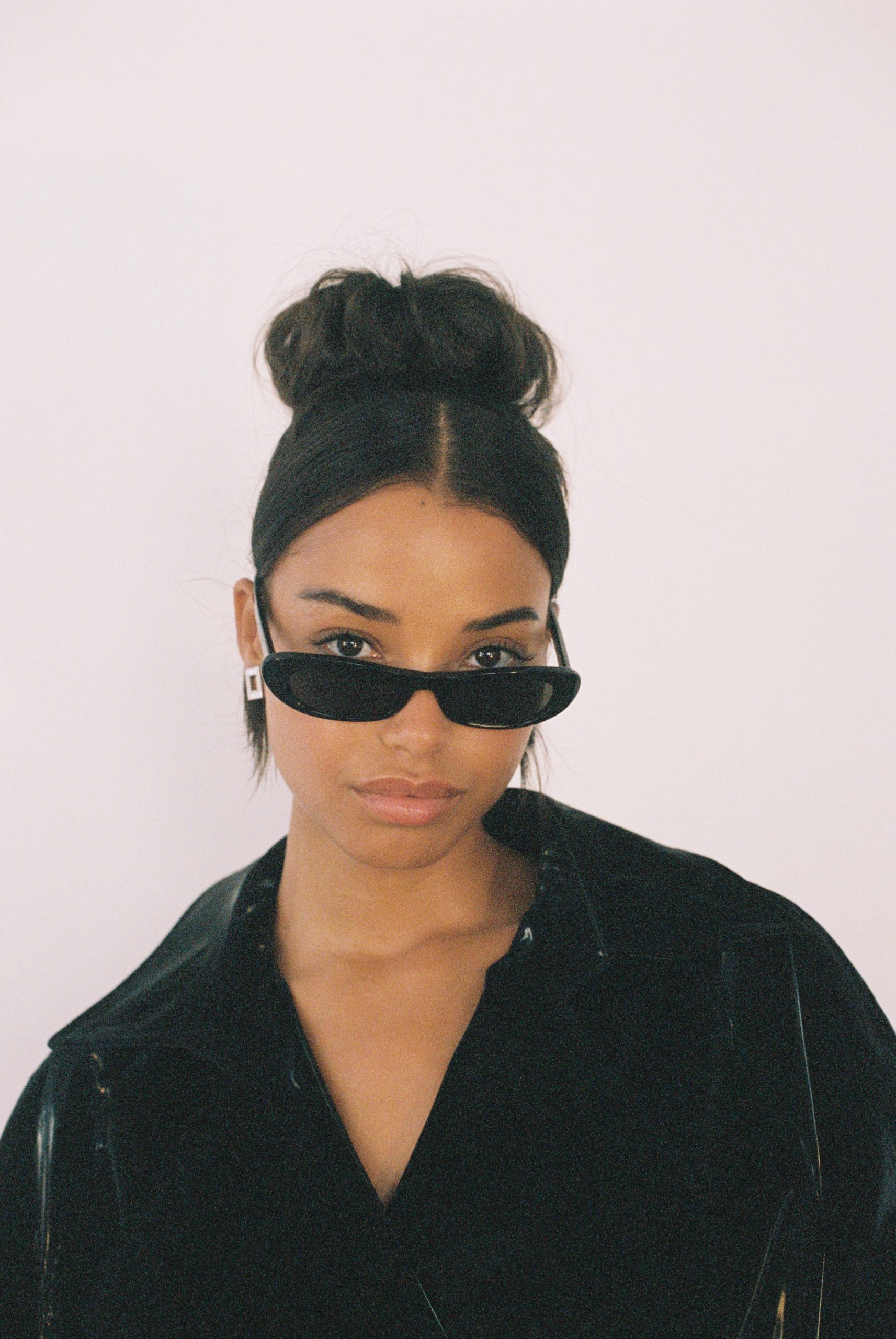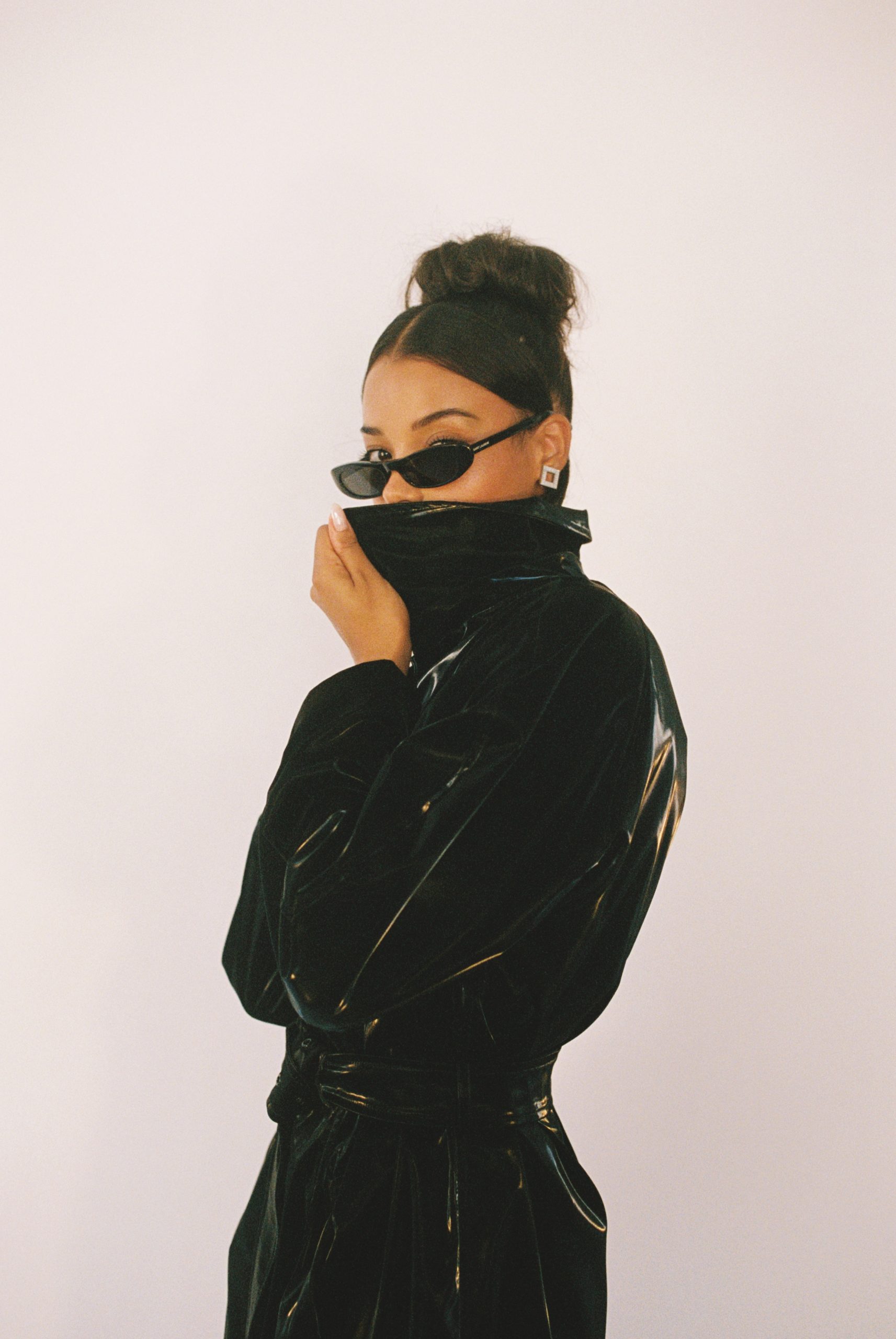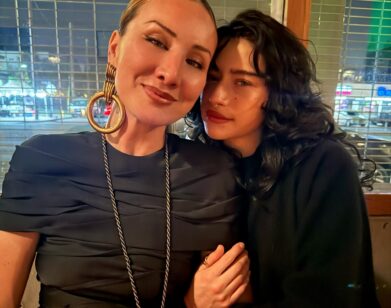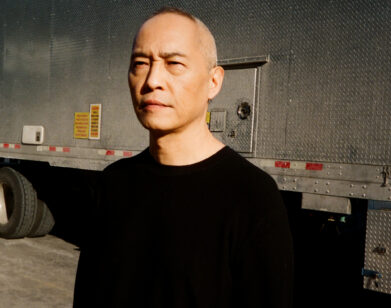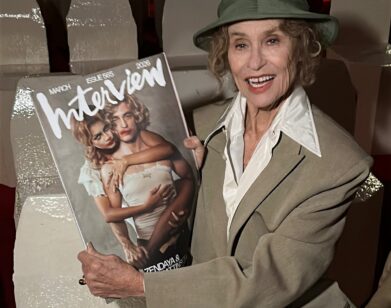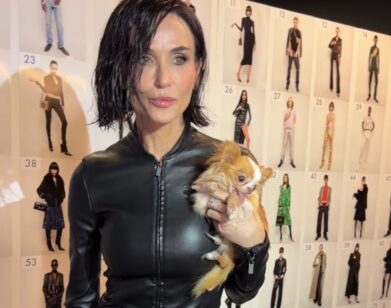IN CONVERSATION
Ella Balinska Is Learning to Play the Game
Most actors work their way up to action star status, but for Ella Balinska, blockbuster success came early. After booking a string of roles in her native England, the 25-year-old actor broke out in the U.S. with a starring role in Elizabeth Banks’ revival of Charlie’s Angels. She followed that up with this year’s Netflix series Resident Evil, where she battled flesh-eating zombies in the adaptation to the popular video game. Fresh off that show’s untimely cancellation, Balinska is back with another kinetic performance in the blood-soaked thriller Run Sweetheart Run. The Blumhouse production, about a woman escaping the blind date from hell, premiered at Sundance back in 2020 and was a casualty of the pandemic, gets a second life this fall when it hits Amazon Prime. When Balinska isn’t fighting on screen, you can find her fighting in front of one, usually with fellow actor and Call of Duty fiend Nicholas Galitzine. To accompany her spread of Bond girl-meets-Bond villain looks from Saint Laurent’s Fall 2022 collection, Galitzine called up his gaming buddy for a quick check-in.
———
BALINSKA: Hi!
GALITZINE: Of course, you’re in your gaming room.
BALINSKA: There’s nowhere else I can take Zoom calls.
GALITZINE: So you thought this was for Interview, but it’s actually for Gamers Weekly.
BALINSKA: This is arguably a terrible idea.
GALITZINE: Listen Ella, I’m going to be on my most professional behavior. I’ve been given lots of questions to ask you.
BALINSKA: I’ll be giving you lots of answers.
GALITZINE: But this is particularly funny considering there’s a part of me that wants to just take this interview completely off the rails.
BALINSKA: I know, but they’ve actually got to make a piece.
GALITZINE: Exactly. Interview, I’m not going to let you down. Miss Balinska, very good to see you. Where are you in the world?
BALINSKA: I’m in my office in Los Angeles. Are you in NYC?
GALITZINE: No, I’m in L.A. as well.
BALINSKA: I’m coming over after this.
GALITZINE: I’m leaving tomorrow for a few days.
BALINSKA: Does that mean I can have my Xbox back?
GALITZINE: Yes, you can have your Xbox back. I wanted to talk about Run Sweetheart Run. What was it that drew you to the project initially?
BALINSKA: I got this script from my team and I read it in one sitting over a lunch break. I absolutely flew through it. And then at that point, I was like “Okay, I need to be part of this. I need to meet the creatives. I want to do it.”
GALITZINE: You filmed it a while ago, but I remember talking to you at the time and you were filming all around L.A. Is that correct?
BALINSKA: Yes.
GALITZINE: You were doing a bunch of night shoots, and it was very physical, but what would you say was the hardest part of filming that, the physical or emotional?
BALINSKA: Both, because we shot it in the beginning of January 2019.
GALITZINE: Pre-the world bursting into flames.
BALINSKA: Yeah, pre-Rona. On the first night it started raining. We were all like “Well, I guess it’s raining for the rest of the film then.” Because the entire film happens over one night. So even on nights where it wasn’t raining and it was actually quite pleasant, we’d have to get the rain machine in.
GALITZINE: Stop, you didn’t tell me that. What are the odds as English people where have been born and bred in a country of gray and constant rain, are transplanted to the sunniest city in the whole fucking world, and the one night you need fucking continuity, it’s like, nope.
BALINSKA: So that was one of the tribulations, but also if you take apart the script, there are some really important messages underneath everything. And obviously, before you do any of those scenes, I spoke a lot with Shana the director to really dissect what those moments are and go through those beats so that we don’t glorify any of those sensitive topics. So having that in the back of your mind whilst you’re shooting something like this night after night after night can get quite heavy.
GALITZINE: That’s actually a very interesting thing to touch on that people don’t understand about acting a lot of the time is because you have to emotionally put yourself in a place where—someone’s knocking on my hotel room door. I’m going to pause you for one second.
BALINSKA: Please tell me it’s room service. If it’s room service, you have to share what you’ve got.
GALITZINE: He’s asking me if I need clean cups.
BALINSKA: The room is being serviced but it’s not room service.
GALITZINE: But as I was saying, Balinska, acting is all about empathy, and putting yourself in someone else’s shoes, and living it. I’m not saying you have to be method, but you take on the trauma, the person, the feelings, all of the emotional baggage of the character. Did you find that you were able to switch off when you weren’t shooting and then turn it back on?
BALINSKA: Yeah, you’re on set hyperventilating for 12 hours a day. I didn’t come out of it feeling the echoes of what I’d done on set that day, but there was no recovery period.
GALITZINE: I’d say knowing you as well as I do, the projects that you like to choose comment on society and have a sort of resonance. What do you feel like this film has to say about society as a whole?
BALINSKA: Pre-pandemic, I was definitely in a space where I was wanting to explore characters that are fighting for survival. Just the plight of the female, the Black female, the strong Black female—extend the list how you will—in these extraordinary situations. I always found it very fascinating. Then funnily enough, the last two years happened, and we all were in a constant state of needing to survive. Now that I’ve explored that both creatively and literally, I’m not really in that headspace anymore and I’m excited to explore other avenues.
GALITZINE: I want to talk about the experience of filming Resident Evil in South Africa. The filming experience itself, but also developing and evolving as an actor, and as a young black woman, and how it felt like an incredibly formative time in your life. I know that’s a really broad, vague question, but it was very beautiful to see as your friend, how the experience had this transformative effect on you.
BALINSKA: It was strange because we were in a period of quarantine regardless, and then I was whisked to a far away land and, beautiful as it was, I was very much on my own. I didn’t have anyone come and visit me. It really left me to my own devices. Unlike Run Sweetheart Run where I was on set every single second of every day, I did have a little more time off and time to reflect. The experience on set was just so different because I felt a lot less of the pressure of the production being on my shoulders and that it was more of a collaborative effort. I had been on set, and someone goes, “Hey, how’s your day going?” You might be having the worst day and it’s easy to go, “Yeah, everything’s great, everything’s amazing.”
GALITZINE: As actors, we’re tethered to people pleasing.
BALINSKA: Now I’ll go on set, and it’s like, “Hey, Ella, how is it going?” “Mate, load shedding completely ruined my game of Call of Duty this morning.”
GALITZINE: Which is unacceptable.
BALINSKA: Just unacceptable. “But I’m ready for a great day on set.” And even just that, it takes less pressure off yourself, and it takes pressure off people around you who are sensing the weird vibes.
GALITZINE: I completely agree with you. Vulnerability can be a superpower, and I think it’s something we need to embrace as actors, otherwise it just builds and builds. The resulting cancellation of the show must have been disheartening and frustrating in some ways. I’ve had a Netflix show canceled as well. I immediately empathized with you, but was obviously very adamant, knowing you and knowing your talent as I do, that there would be plenty of light at the end of the tunnel. Can you speak on that and what you feel like it’s taught you about yourself, about the industry, and about the job?
BALINSKA: Honestly, if everything went to plan, there’d be too much on TV.
GALITZINE: There’s already too much content.
BALINSKA: But in all seriousness, it was disheartening to hear. However, I immediately jumped to how happy I was that I was able to make the fans who loved the show really proud and excited about this new little story that we told in the Resident Evil universe.
GALITZINE: You’ve obviously had a lot of successes, but 90 percent of this job is about doing auditions and getting rejected.
BALINSKA: I was a massive fan of the story and the character, but also of the franchise itself. I used to play the games. Who would I have been, looking at my eight-year-old self telling her that I said no to playing the lead character in Resident Evil?
GALITZINE: I think first and foremost, like you said, it’s so difficult nowadays to have a show or film that is able to have longevity over a five, six, seven year run. But the fact that you’ve played an iconic character within an iconic intellectual property like Resident Evil, and at one point you were number one on Netflix. Still, my perception has changed about the jobs that I do, and understanding that critical acclaim, or whether a show is picked up, is not the be all, end all. Your entire career, you’ll remember the time you were in South Africa shooting a zombie apocalyptic show.
BALINSKA: What an experience.
GALITZINE: Do you feel you learnt an equally large amount on Charlie’s Angels? That was your first break in a lot of ways. You’re acting with very recognizable names, Elizabeth Banks is directing you, and once again, your name was attached to a very recognizable IP.
BALINSKA: Charlie’s Angels was a prime example of getting thrown into the deep end. One of my mottos is “Make interesting choices.” Charlie’s Angels was an exact example of that where I was just thrown straight into the center of a blockbuster film, massive budget, flying here, flying there, incredible people that I’m working with. The fact that I can say I was in the same frame as Sir Patrick Stewart is unreal.
GALITZINE: Bizarre.
BALINSKA: But that was when I learned to trust myself as a creative decision maker. I went and did the audition. They loved my exact portrayal of that character, so I went on to set every single day knowing that I didn’t need to question myself. That was very freeing.
GALITZINE: It’s a huge part of it. The imposter syndrome and trying to quell that every day of going on set, and trusting that you’re there for a reason.
BALINSKA: You have to remind yourself you’re the person who booked this job, you are the person standing here in this scene about to do this take.
GALITZINE: There’s one role in particular that you and I have talked about before, and we’re desperate to reboot Disney’s Atlantis because we think as a duo, we’d absolutely kill that.
BALINSKA: I think myself as Kida and you as Milo. We’re here.
GALITZINE: This next topic is a very interesting one as well because you and I have talked a lot about this, and obviously we live a very transient life. Where do you really consider home?
BALINSKA: I literally had this conversation last week. I think the house that I’m in right now, in whatever country it might be, would be my home. I think it’s when I’m surrounded with the things I love, with access to the people I love, being able to game, or being able to watch movies, or to go upstairs and color coordinate my wardrobe.
GALITZINE: No, I want the people to know how many white sneakers you have. It’s stupid.
BALINSKA: If you can name the shoe, I probably have it in white, but they each serve a purpose. An Adidas Superstar does a very different thing than Jordan 1 high top.
GALITZINE: I want to ask you some quick-fire questions. What’s your favorite thing about being on set?
BALINSKA: Just chatting shit with the crew. I love the friendships, bonds, and inside jokes.
GALITZINE: You’re such a liar. I know that you lock yourself in your trailer all day long and don’t talk to anyone.
BALINSKA: Listen, all I do, Nick, is just plug in the HDMI, the PS4, and run it with you in Verdansk.
GALITZINE: That’s all you do between takes. “Can we get Ms. Balinska to set?” They’re like, “No, she’s playing Call of Duty.”
BALINSKA: She’s in the gulag right now.
GALITZINE: Always in the proverbial and literal gulag. What gives you energy?
BALINSKA: Aside from Celsius?
GALITZINE: Wait, are you sponsored by Celsius? Because I don’t want you to promote them without getting the bag. You got to secure that bag.
BALINSKA: Yeah, exactly. Omit, omit! Honestly, laughing with my friends and music.
GALITZINE: What is the hardest you’ve worked?
BALINSKA: We both know the answer to this question. The hardest I’ve worked was probably the last week of shooting Resident Evil. I could count on one hand how many hours of sleep I got that week.
GALITZINE: And the adrenaline starts to run out because you see what’s on the horizon. What’s your motivation?
BALINSKA: Hopefully one day working with my friends. I haven’t, unfortunately, had the luxury of working with someone that I know yet.
GALITZINE: I just did that for the first time and it’s extra weird because It re-contextualizes your relationship in some ways, and you feel like you know everything about this person and then you get to know them in a very different way. Like you said, you’ve got the producer gene within you. When you can facilitate that, when you can be the person to create community, that’s very exciting. How do you unplug, other than the obvious?
BALINSKA: My way of unplugging, funnily, is by plugging in. I love gaming with my friends, and by friends, I mean you.
GALITZINE: Can you tell the people how much I’ve taught you as a gamer?
BALINSKA: How much you’ve taught me Call of Duty.
GALITZINE: I’ll take that. What is worth fighting for? And don’t say Verdansk.
BALINSKA: I was about to say the loadout baby, the loadout! There’s a target audience being reached for this interview.
GALITZINE: There’s definitely a target audience being reached.
BALINSKA: I think something that’s worth fighting for would be the decisions that you make and the decisions of people that you love around you. It’s really important to fight for yourself and in whatever capacity that might be, as long as you’re not hurting anyone.
GALITZINE: I think that is very much synonymous with how I know you.
BALINSKA: Yeah, and it’s funny how it echoes into a lot of the characters that I’ve played thus far. As anxiety inducing as it might be in the process, it’s so much more freeing to be able to share with other people. And I can only thank you for being one of them.
———
Hair: Sean Fears
Makeup: Paul Blanch


